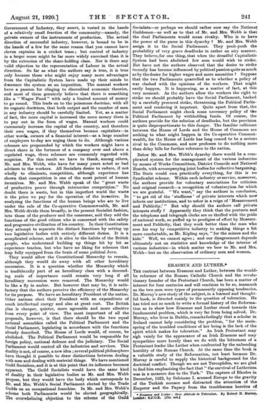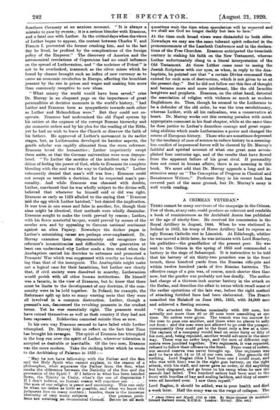ERASMUS AND LUTHER.*
THE contrast between Erasmus and Luther, between the would- be reformer of the Roman Catholic Church and the revolu- tionary founder of the Protestant Church, has been a matter of interest for four centuries and will continue to be so, inasmuch as the two men were types of permanently opposing tendencies. Dr. Murray's new study of the subject, in a learned and thought- ful book, is directed mainly to the question of toleration. He has tried not so much to write a formal history of the Reforma- tion as to show how Erasmus and Luther stood towards this fundamental problem, which is very far from being solved. Dr. Murray, who lives in Dublin, remarks feelingly that a scholar in Ireland cannot help considering the problem, "for the main- spring of the troubled conditions of her being is the lack of the spirit which makes for toleration." An Irish Protestant may sigh vainly for the appearance of an Irish Erasmus and may sympathize more keenly than we do with the bitterness of a Protestant leader like Luther when confronted by the unbending hostility of the Roman Church. At the same time the book is a valuable study of the Reformation, not least because Dr. Murray is careful to supply the historical background for the doctrinal conflict. Though we are not Turcophiles, we are glad to find him emphasizing the fact that " the survival of Lutherism was in a measure due to the Turk." The capture of Rhodes in December, 1522, by Suleiman I. aroused Europe to the gravity of the Turkish menace and distracted the attention of the Emperor and the Papacy from the troublesome heretics of * Erasmus and Luther : their Attitude to Toleration. By Robert H. Murray. London: B.P.O.K. [25e. net)
Southern Germany at an anxious moment. " It is always a. mistake to pass by events ; it is a serious blunder= ith Erasmus, and a fatal one with Luther. In the critical days when theviews of Luther began to appear, the contest between Charles V. and Francis I. prevented the former crushing him, and to the last
day he lived, he profited by the complications of the foreign policy of the Emperor." The disoovery of America and the astronomical re-relations of Copernious had no small influence on the spread of Lutheranism, and " the muleteer of Potosi r is not to be overlooked, inasmuch as- the silver mines which he found by chance brought such an influx of new currency as to cause an economic revolution in Europe, affecting the humblest
peasant by the rise in prices and wages and -making him more than commonly receptive to new ideas.
" What misery the world would have been saved," cries Dr. Murray in an eloquent page on the importance of great personalities at decisive moments in the world's history, " had Luther and Erasmus been as sympathetic towards each other as Luther- and Melanchthon were." But they could not co- operate. Erasmus had undermined the old Papal system by his satires at the expense of the corrupt Roman hierarchy and the monastic orders and by his plea for the reading of the Bible, yet he had no wish to leave the Church or disavow the faith of his fathers. He approved of Luther's movement in its earlier stages, but, as Lutheranism developed its harsher aspects, the gentle scholar was rapidly alienated from the stern reformer. Erasmus loved the humanities ; Luther impatiently swept them aside, so that the German universities were soon depopu- lated, " To Luther the saorifice of the intellect was the con- dition of feeling the power of God, while to Erasmus its complete blending with the soul was the way to Catholic truth." Luther vehemently denied that man's will was free ; Erasmus could not accept so terrible a doctrine, for he respected man's per- sonality. And while Erasmus was- obsessed with doubts, Luther, convinced that he was wholly subject to the divine will, believed that whatever he himself said or did was right.
Erasmus as early as 1523 alluded to the saying that " Erasmus laid the egg which Luther hatched," but denied the implication. It was true in one sense and false in another, for, though their aims might be identical, their methods were wholly dissimilar. Erasmus sought to make the truth prevail by reason ; Luther, with his fierce masterful temper, would prevail by means of the secular arm and by appealing to German national sentiment against an alien Papacy. Nowadays the darker pages in Luther's astonishing career are perhaps over-emphasized. Dr. Murray examines them dispassionately and recognizes the reformer's inconsistencies and difficulties. Our generation at least can understand why Luther made a firm stand when the Anabaptists carried his doctrine to extremes and promoted a Peasants' War which was suppressed with cruelty no less shock- ing than that of the insurgents. The Anabaptists might make
out a logical case .f or their fanaticism, but Luther saw clearly that, if civil society were dissolved in anarchy, Lutheranism would perish with all other human institutions. He himself was a fanatic, in the view of Erasmus, but he knew that there must be limits to the development of any doctrine, if the com- munity were to be held together. In Poland, for example, the Reformers split up into so many warring sects that they were
all involved in a common destruction. Luther, though a peasant's son, denounced the revolting peasants in the crudest terms. Yet he was essentially right. The peasants would have ruined themselves as well as their country if they had not been repressed. Bolshevism connoted suicide then as now.
In his own way Erasmus seemed to have failed while Luther triumphed. Dr. Murray bids us reflect on the fact that Time
has brought his revenges. The spirit of Erasmus has triumphed in the long run over the spirit of Luther, wherever toleration is accepted as desirable or inevitable. Of the two men, Erasmus was the more modern. Take the striking letter which he wrote to the Archbishop of Palermo in 1522 :-
" May he not have fellowship with the Father and the Son and the Holy Spirit who cannot explain, to the reason of a philosopher, what separates the Father from the Son, what marks the difference between the Nativity of the Son and the procession of the Spirit ? If I believe in what has been handed down, the Trinity in Unity, what's the use of disputation ? If I don't believe, no human reason will convince me. . . . The sum of our religion is peace and unanimity. This can only be when we define as little as possible, and when we leave the judgment free on many matters ; besides, there is the immense obscurity of very many subjects. . . . Our present prob- lems are awaiting an oecumenical Council. Better let all such
questions wait the time when speculation will be removed and we shall see God no longer daddy but face to face."
At the time- such broad views were distasteful= to both, sides: Nowadays we may see the same tolerant spirit reflected in the pronouncements of the Lambeth Conference and in the declara- tions of the Free Churches. Erasmus anticipated the twentieth century in staking his faith on the New Testament, whereas Luther unfortunately clung to a literal interpretation of the Old Testament. At times Ldther came near to seeing the Jewish Scriptures with our eyes, as when, in reply to the Ana- baptists, he pointed out that " a certain Divine command then existed for such acts of destruction, which is not given to us at the present day." But he did not follow out this line of thought and became more and more intolerant, like the old Israelite lawgivers and prophets. Erasmus, on the other hand, detested the association of religion with violence as much as modern Englishmen do. Thus, though he seemed to the Lutherans to be a defender of the old order, he was the true revolutionary, whereas Luther, with all his radicalism, was a conservative at heart. Dr. Murray works out this seeming paradox with much appropriate comment in his final chapter, while at the same time he does justice to Luther's dauntless courage and great organ- izing abilities which made Lutheranism a power and changed the course of European history. Those who are sometimes depressed by the tendency of men of science to reduce history to a meaning- less conflict of impersonal forces will be cheered by Dr. Murray's faithful and spirited account of what one great man accom- plished four centuries ago, and of the results that have flowed from the apparent failure of his great rival. If personality does not count in human affairs, there is no meaning in this book. We must add that Dr. Murray appends a long and in- structive essay on " The Conception of Progress in Classical and Renaissance Writers." Professor Bury in his recent book has covered part of the same ground, but Dr. Murray's essay is well worth reading.



































 Previous page
Previous page